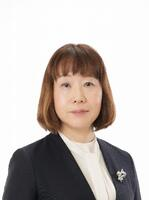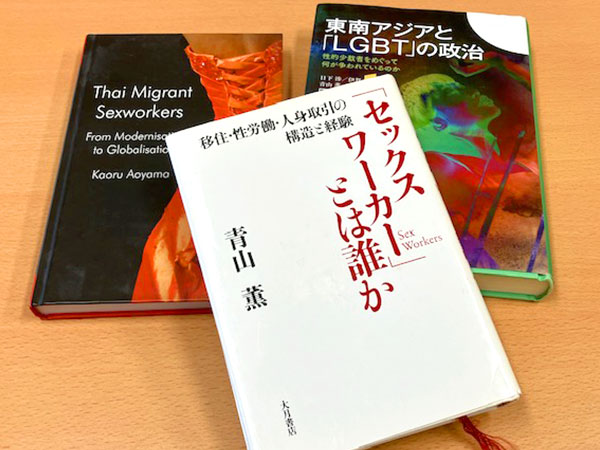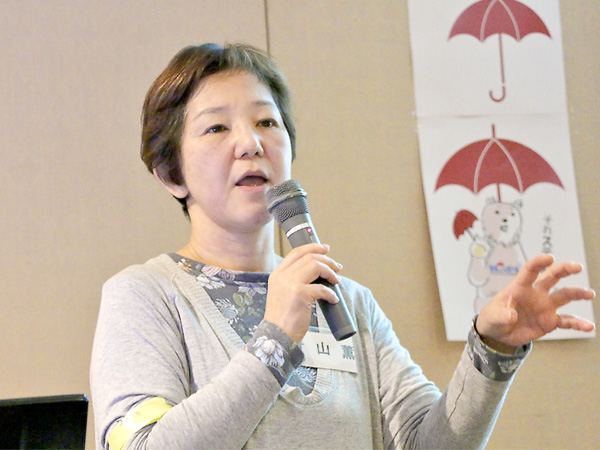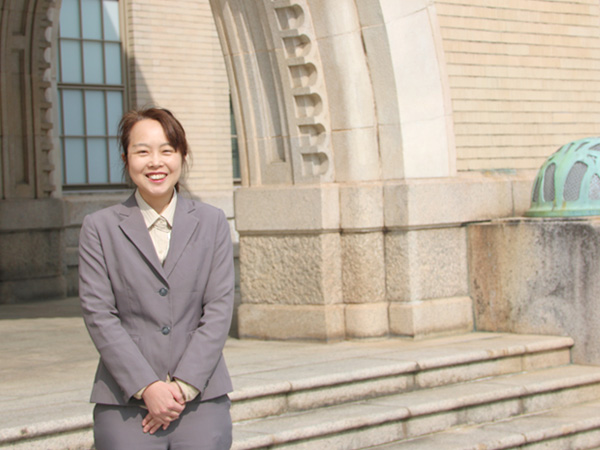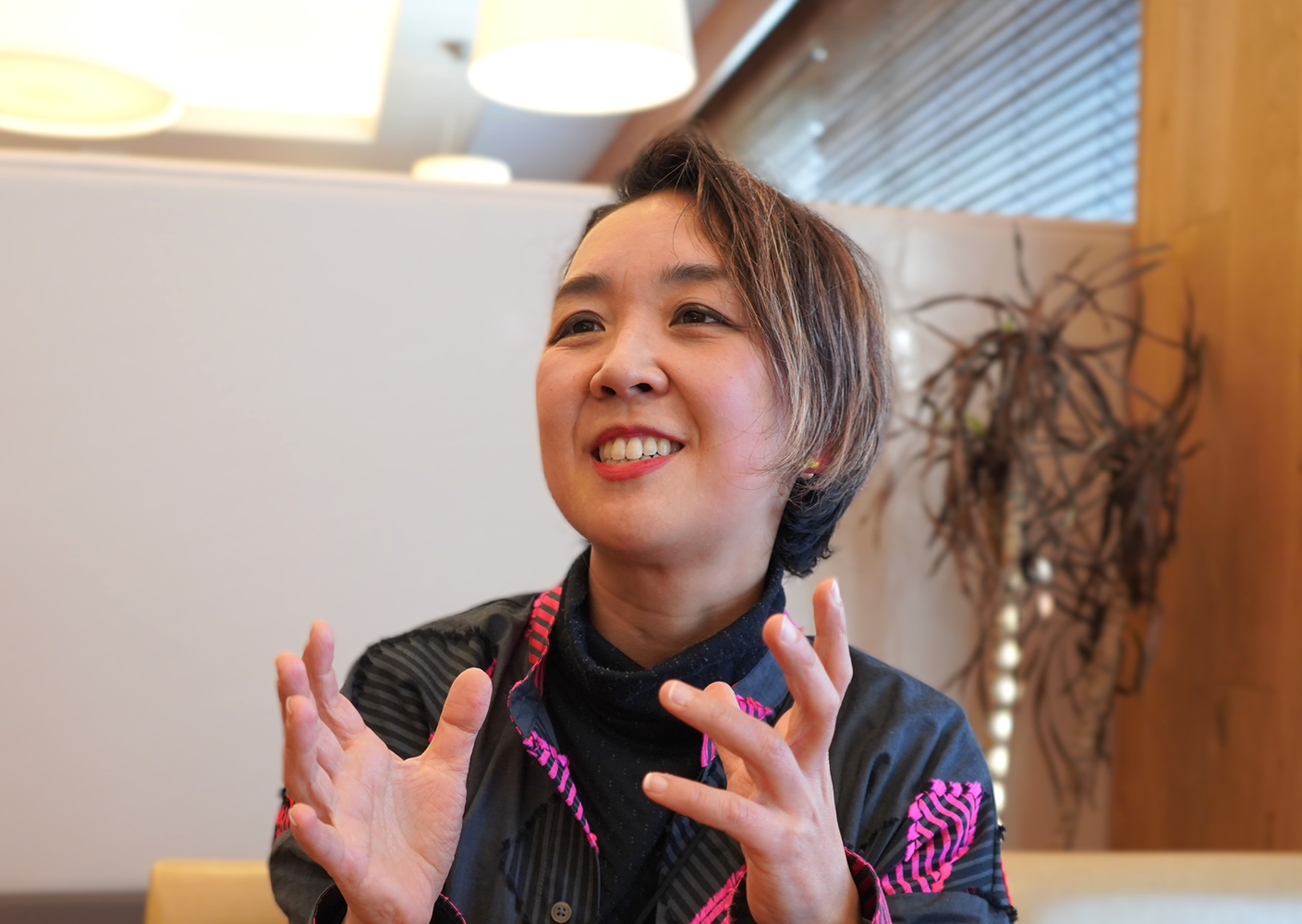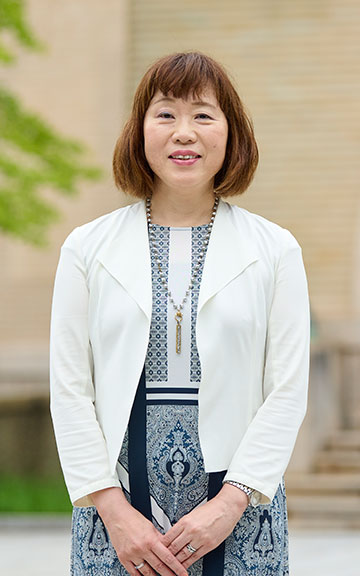
Less than 20% of researchers in Japan’s universities are women, ranking the lowest out of all the world’s developed nations. At Kobe University, they are also in the minority, however in this article we would like to introduce one female researcher who has overcome great obstacles to attain many achievements. As the former Dean of the Graduate School of Business Administration, Professor MINAMI Chieko is a forerunner who became Kobe University’s first female dean of a social sciences subject and has recently published papers that were extremely well received internationally. We spoke to Professor Minami about her research findings, future goals and her path to becoming a researcher.
Accepted for a top international journal
Recently, successive papers on your international joint research were published in top management journal and a leading international journal in economics. This is a wonderful outcome, isn’t it?
Professor Minami:
This first paper was accepted for the American Economic Journal: Microeconomics in 2021 and published in November 2022. It is considered difficult for Japanese researchers to be published in this journal. The organizational structure of retail chains consists of the headquarters and stores. There is a gap in demand between the national market and regional markets, therefore retailers have to make adjustments constantly while keeping an eye on both the predicted and actual gap. I researched AEON retail in order to find out in which circumstances it is best to transfer power (to local managers) and when top-down management is more likely to yield results. AEON operates large stores selling a variety of products (similar to Walmart in the US).
Adjustment and coordination in an organization is one of the major topics in game theory so my team conducted empirical analysis on this theory. We found out about numerous tasks at the company (including morning meetings and the giving and receiving of orders) and how many minutes a day employees talk to their bosses, and turned all this work-related information into data, ending up with a huge amount of data. Prior studies intuitively predicted that delegation to local managers would yield better results in a highly changeable market. However, using the mathematical model my co-researchers built, we verified that in reality, top-down centralization is an important factor for successfully making adjustments when coordination is important, as predicted by game theory.
The other paper came about during this research into AEON when a Chilean researcher at London Business School whom I have never met suggested it might be interesting to combine business data from beverage manufacturers in Chile. Research has already shown that for various tasks, people only do what they are good at when they are under time pressure, but we did not know if the reverse was true. We were able to prove with data and models that managers do what they are not good at when time allows. This paper was accepted by the top international management journal “Management Science” in February 2022 and subsequently published online. For this study I worked with overseas researchers whom I had never collaborated with before. I was surprised by how strategically they thought about what kind of data they could obtain and which theories they should approach it with to produce a good paper.
How did you become involved in this international joint research?
Professor Minami:
On my mentor’s recommendation, I engaged in research on distribution systems (particularly in the retail industry) after obtaining my doctorate in the field of consumer behavior research. My interests lie in changes in company organization and company relationships through concepts such as information and communication. In the retail industry, the development of Information Communication Technology (ICT) has changed customer management, which has led to research on customer relationship management (CRM). I also studied market information-driven supply chain management in the manufacturing retail industry. Put simply, this involved analyzing the structure and efficiency of fast fashion.
When I became a principal investigator and was selected twice for the Grant-in-Aid for Scientific Research (KAKENHI A), which is a large research grant in the humanities and social sciences fields, the comparatively abundant research funds led to me conducting more overseas presentations and joint studies with researchers from abroad. As an extension of this, a researcher from the U.S. gave me the opportunity to conduct joint research on retail companies’ organizational transformation and growth, which was the theme of the Grant-in-Aid for Scientific Research. It takes time for academic papers to be accepted, and the international joint research mentioned at the beginning of this interview was also started in 2017.
How DX is changing production
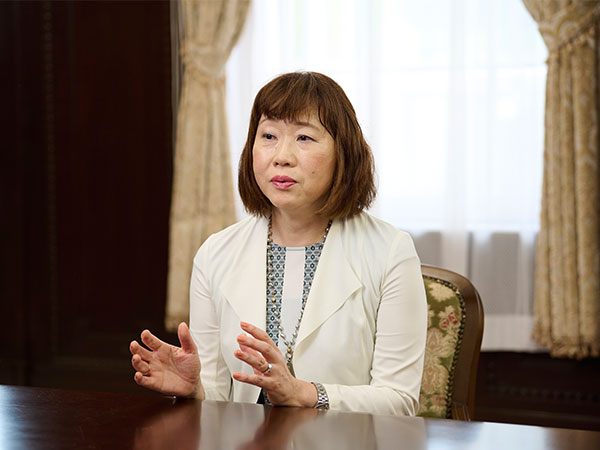
The coronavirus pandemic has highlighted how Japan is behind on digitization, with DX (digital transformation) becoming a buzzword. This has drawn immediate attention towards research on making full use of ICT and AI (Artificial Intelligence) not only in distribution and retail but also in revolutionizing production.
Professor Minami:
Since a decade or so ago, I have been participating in multiple research projects related to enhancing manufacturing industries with professors from other fields. In 2017, a book aimed at businesspeople that I co-authored entitled ‘Servitization strategies for the manufacturing industry’ (製造業のサービス化戦略, published by Chuokeizai-sha) was published. Around this time, I started to have more opportunities to exchange opinions with people in industry, and I felt that I should work on this as a full-fledged academic research project. The themes include, for example, whether or not a manufacturing company's service integration is more likely to progress if it is more dependent on its customer companies, and whether or not a manufacturing company needs to become more service-oriented. I still analyze data from major electronics manufacturers, but the basic question is ‘What are the facilitating factors and the hindering factors for servitization in the manufacturing industry?’ If we dig deeper, we can see that the industry becomes service-oriented through a combination of various conditions related to digitization, and not as a direct result of the competitive environment.
When you hear the term ‘servitization’, it sounds like services are being discussed, but it actually refers to changes in manufacturing. For example, in recently-manufactured cars many parts are digitally controlled. When components are digitally controlled, varied data can be obtained and used to assess how the hardware is operating and this is not just limited to the car industry. I wonder if we could use that data to provide consulting and hardware asset management, but in the end, such a move would change the business. In other words, this will have a knock-on effect where the organization, the relationships between companies, and the approach towards the market will all change. Production management research is progressing in this direction, however sufficient research has yet to be conducted on this area in industries’ marketing fields. Therefore, I believe that we must not only study the technology, but also the final remaining question as to how business will change. Japanese companies are able to develop products, but they are not so good at commercializing them, so I would like to tackle this through my research.
Inspired by female researchers in America
You have continued to work in a research field where there aren’t many women and you also became the first female dean of the Graduate School of Business Administration. Have you faced many difficulties to get where you are today?
Professor Minami:
There are exceedingly few women in the fields of economics and commercial studies. Until I first started working in these areas, I had never experienced standing out so much just for being a woman so I felt quite confused. After graduating, I found a new career as an assistant in a university’s research support office and studied abroad in the US. There were many female PhD. students and they were all extremely self-aware and determined to do what they wanted regardless of gender, which really inspired me. Due to this, I was very conscious of the discrimination against women when I re-entered Japanese university and began my research career. It was still rare at the time to have the experience of studying abroad. My time studying abroad and in Japan was combined and I was offered a position at a university in the 1st year of my PhD. before I had received my degree. I think I still felt self-conscious and had to spur myself on despite being hired by a university.
At the time, the postmodern approach to consumer studies (nowadays this is often referred to as ‘consumer culture theory’) was attracting a lot of attention, and I obtained my doctoral thesis in that area. I thought that consumer behavior was a field in which I could make use of my own experiences and intuition, so in that sense, my late entry into academia and the fact that I am a woman was not a hindrance. I majored in sociology as an undergraduate, so I could take a completely different approach to what I had been taught, which gave me confidence.
When I got the post at Kobe University, my mentor told me ‘It’s like Mount Koya*, women are not allowed’. I felt the pressure to do my best so that other women could follow in my footsteps. Kobe University is a research university where you can do whatever you want to do, but I had always considered myself far from the business administration field’s so-called conservative mainstream, and since I had transferred from another university, I did not think I would ever become the Graduate School’s dean. In the preliminary election for the dean position my appeal was based on tackling university administration issues, and I was surprised when I was elected.
*Often termed the center of Shingon Buddhism, Mount Koya in Wakayama Prefecture is home to a large settlement of temples. Up until modern times, women were forbidden from entering.
What are your future research goals?
Professor Minami:
I will invite co-researchers from abroad to study a new theme; the issue of how retailers can adapt their organizations, product policies, and supply chain management in the face of short- and long-term climate change. This project has been selected for Kobe University’s Strategic International Collaborative Research Grant. Recently, there has been much focus on how to integrate sustainability into management and make organizations more sustainable. This research will be a part of such efforts, and we plan to test and analyze a new model to determine how to make organizations resilient to climate change (a phenomenon that is very difficult for retailers tackle) by utilizing our past research on organizational adjustment and market adaptation. I expect to have the results of the post-data collection analysis around the beginning of 2023. The paper will be published in two or three years’ time.
Profile
After graduating from Kobe University’s Faculty of Letters in 1984, Professor Minami went on to obtain an MA in communication from the Michigan State University in 1988. In 1998, she attained a Doctorate in commerce from Kobe University’s Graduate School of Business Administration. After serving as an assistant professor at Yokohama City University among other positions, she returned to Kobe University’s Graduate School of Business Administration as an assistant (associate) professor in 2002, becoming a professor in 2004. In 2018, she was appointed Director of Kobe University’s Career Center and then served as the Dean of the School and Graduate School of Business Administration from 2020 for 2 years. Since 2022, she has been an executive advisor to the president of Kobe University.

